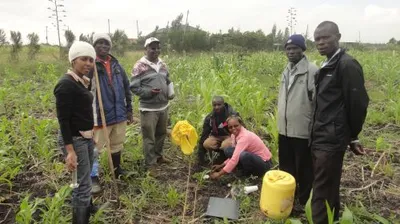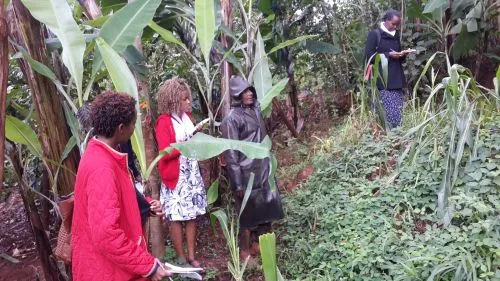Sustainability of ecological organic agriculture in Kenya
Doctoral research @ ZEF by Juliet Wanjiku Kamau
You conducted research on organic farming in two regions in Kenya. Why did you choose this topic?
I chose my topic because of the rapid increase in organic agriculture, especially in East Africa. It is driven by local and international demand for organic produce in recent years. In addition, the African Union endorsed it as one of the main pathways to more sustainable development on the continent, and is promoting it through the “Ecological Organic Agriculture” initiative. However, organic agriculture is still in its infancy on the continent, and consequently, a lot of research is needed on its performance relative to other farming systems.
Based on your research outcome, is organic farming an attractive option for small-scale farmers in Africa and if yes, under which conditions?
Organic agriculture is an attractive option for smallholder farmers. However, they need to be empowered and encouraged to make long-term farm investment and carry out farming as a business. Especially, an enabling macroeconomic environment with properly functioning financial and product markets is needed.

What were your main conclusions and recommendations at the end of your doctoral research?
Organic agriculture can improve the sustainability of smallholder farms in Kenya: Wealth creation is important for the adoption of organic agriculture. However, agricultural practices of organic agriculture farms need to go beyond the lack of usage of agrochemicals, and adopt more practices that aid in building and maintaining soil health. Interventions aimed at improving the welfare of smallholders, who are the main food producers globally, need to systematically target specific requirements of different smallholder farm types.

Building the total stock of physical, financial, human, social and natural capital is vital for sustainable smallholder farming systems in Kenya and beyond, which will aid in achieving the sustainable development goals.
You have spent quite some time “in the field”. What were your most interesting or intensive experiences? What were the main challenges you had to deal with?
Some farmers refused to be interviewed for several reasons e.g. some said they did not have time, some wanted compensation and others felt that researchers just collected data and did not see any results. I had very Interesting debates with farmers and I tried to convince them that research benefits take time and although some were asking about immediate benefits from the data being collected, I explained that the impact of academic research, particularly individual PhD research output could take longer.
Movement sometimes was difficult due to poor conditions on roads, extreme weather conditions such as El Niño rains as well as some households being located in very hilly areas inaccessible by car. Some respondents could only speak the local language, so translation was needed which was time-consuming. Gender inequity sometimes was an issue. Women failed to speak for fear of being reprimanded by their husbands.
Despite this, most farmers were very willing and committed to support my research efforts and were even going out of their way to help with logistics. We were always given a cup of tea and food many times.
You are part of the RLC program. What benefits did it bring to you and your research?
My research is closely aligned with areas of interest and work of Laureate Hans Herren who received the “Alternative Nobel Prize” in 2013. During my field work I was strongly supported by Hans Herren’s organization BIOVISION Africa Trust. I was allowed to use the BIOVISION contacts and infrastructure in Kenya. Particularly, the advice by Dr. David Amudavi, Director of BIOVISION Africa Trust in Nairobi was extremely helpful.
What are your professional plans for the future?To continue engaging in scientific research and in initiatives that seek to address the challenges being faced by developing countries.

